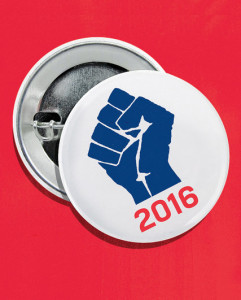election
Revolution…not evolution.
March 12, 2016New York Times:
(Editorial Board)
‘Revolutions are typically bottom-up, not top-down, events. Mr. Sanders’s campaign is powered by $30 contributions and an army of young volunteers, but there are not enough elected office holders in Congress or in statehouses to carry out his revolution through new laws or policies. And that’s the big difference between running an inspiring campaign and actually governing.
[…]
The mistake is thinking that we get behind a progressive candidate for president, and that will solve all our problems.
[…]
Mr. Sanders’s own political career illustrates what can happen when a revolutionary has no ground troops. For 25 years in Congress, Mr. Sanders has held fast to his progressive message and principles. But he hasn’t gotten many big things done. As an uncompromising political independent, his outsider status has largely prevented him from attracting the support that would be needed among Democrats to turn into law his liberal ideals on health care, on college education and on fighting poverty and climate change.
One need only look to the legislative setbacks for President Obama to see what happens when transformative ideas hit an intransigent Congress.
[…]
As a result, Mr. Obama has presided over the biggest loss of congressional Democrats in modern political history — 13 Senate seats and 69 House seats. Republicans now hold 31 governorships, many more than when Mr. Obama took office. State legislatures, too, have had a surge in Republican control.
The Democratic Party recognizes the problem, but whether it can alter the trend is another matter. Raul Alvillar, the national political director for the Democratic National Committee, says the party has demographics on its side, as a wave of young people reach voting age, and the party, through a series of training initiatives, is trying to inspire them to run for local office.
Ilya Sheyman, the executive director of MoveOn.org, a political advocacy and action group that has endorsed Mr. Sanders, views his candidacy as “a reaction to the Tea Party standing in the way of everything the president wants to do, and a coming of age of a new wave of voters.” He is confident that movements like Occupy Wall Street, the Fight for $15 minimum-wage campaign, and Black Lives Matter will eventually propel young progressives into elective office. He credits Occupy Wall Street with putting the issue of wealth inequality into public discourse, and “now I think what we’re seeing is the electoralization of these issues.”
Mr. Sanders’s supporters say his election will inspire more such candidacies, giving him the congressional backup he needs. But given Democrats’ problems on the state and local level, that could take years — and that’s evolution, not revolution.’
